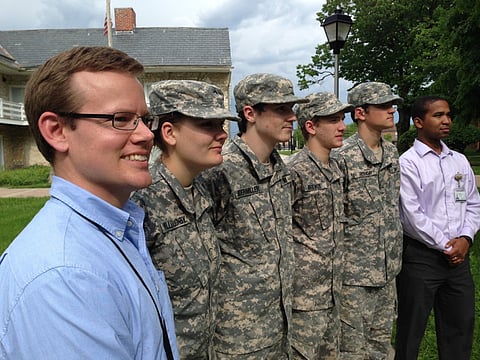A hearing-impaired teacher’s quest for armed service inspires students
The Defense Department declared in a report last month it would be ‘imprudent’ to create a programme assessing deaf people’s fitness for military service

Frederick, Maryland: Four teens in camouflage fatigues march briskly around a brick plaza at the Maryland School for the Deaf, silently marking their cadence in American Sign Language: “Left!” “Left!”
These members of the school’s Cadet Corps aspire to military service, but their path is blocked. Deaf people are barred from joining the armed services, as corps creator Keith Nolan well knows. He’s been told, “No,” since 2001, when he tried to enlist in the Navy at age 18.
Nolan is determined to change that.
“I want to show there are no barriers,” he said through an interpreter.
His determination has led to passage of a House bill bearing his name — the Keith Nolan Air Force Deaf Demonstration Act of 2015, which called for a demonstration programme.
The Defense Department declared in a report last month it would be “imprudent” to create a programme assessing hearing-impaired people’s fitness for military service. It cited the cost of equipment modifications, security risks from wireless assistive devices and the burden for nondisabled service members if their hearing-impaired counterparts can’t perform the full range of military tasks.
But Nolan, his cadets and his congressional supporters are undeterred.
“They’re not taking us seriously,” said Cadet Jennida Willoughby, 16, through a sign-language interpreter. “We’re going to keep fighting back.”
During after-school and occasional weekend meetings, Cadet Corps members compete as teams in contests of physical strength and brainpower, and take turns leading problem-solving missions around town, said David Alexander, a school audiologist and Army veteran who helps to run the programme. They’ve gone overnight camping, taken a field trip to the US Military Academy and made a presentation to other students and faculty about the West Point visit.
The cadet corps is independent, not affiliated with the military’s Reserve Officer Training Corps (ROTC).
But Willoughby, an accomplished scuba diver, dreams of becoming a Navy SEAL.
She and her fellow cadets, all rising seniors at the school 72km west of Baltimore, note along with Nolan that the National Geospatial-Intelligence Agency has been hiring hearing-impaired workers since 1987. The agency, which analyses aerial and satellite data, sent three hearing-impaired analysts to support US military operations in Africa from 2012 to 2014, using only American Sign Language.
And the military already has members in jobs that require sound-deadening earphones such as guiding planes during landings and take-offs from aircraft carriers.
“We can serve our country,” said Cadet Blake Brewer, 17, whose older cousin is a Marine. “We can show what we can do.”
Although firearms training is barred by the school’s no-weapons policy, Brewer said he’s willing to take up arms for his country.
“I’m flexible with where they would need me,” he said.
Cadet Maverick Obermiller envisions himself as an engineer, one of the “supporting roles”, including cybersecurity positions, which Nolan says should be open to hearing-impaired people.
There’s a precedent for hearing-impaired people in military service: The Israel Defense Forces (IDF) have always recruited hearing-impaired volunteers and found ways for them to serve in uniform, spokeswoman Libby Weiss said in an email. She said the IDF communicates with deaf or hearing-impaired soldiers through adaptive devices, text messages, emails and lip-reading. In 2012, the IDF announced an Israeli sign-language course to help commanders communicate better with deaf and hearing-impaired soldiers, then numbering more than 100.
Weiss said hearing-impaired service members are usually exempt from instructing roles, or jobs that would require them to communicate by telephone.
Rep. Mark Takano, D-California, cites Israel’s experience as one reason he will continue pressing for a US demonstration programme. Israel has “the benefit of a more diverse and talented pool of service members,” Takano wrote in an email. “Their example shows that this policy can be effective in some of the most tense and dangerous military arenas.”
Sen. Kelly Ayotte, R-New Hampshire, said in an email that she, too, will continue pushing the Defense Department to see whether Americans with disabilities can serve and meet required military standards.
Nolan, who teaches high-school government and history, said supporting the military in a civilian role isn’t the same as serving in uniform, as one of his grandfathers and a great-uncle did.
Nolan made it through two years of ROTC at California State University, Northridge, before being told his deafness made him ineligible for advancement.
He founded the Maryland School for the Deaf Cadet Corps two years ago to teach skills he deems valuable no matter what career his students choose.
“I want to see them pave the way for the future,” Nolan said. “I have done my part so far, but I want to see them take it and break through.”



